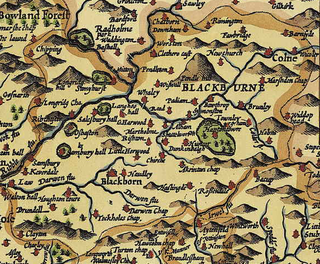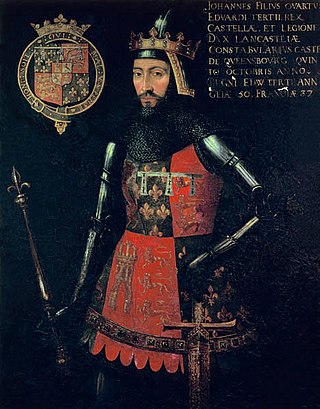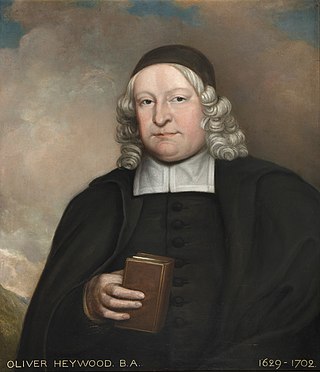
Thomas Jollie (1629–1703) was an English Dissenter, a minister ejected from the Church of England for his beliefs.

Thomas Jollie (1629–1703) was an English Dissenter, a minister ejected from the Church of England for his beliefs.
Thomas Jollie was born at Droylsden, near Manchester, on 14 September 1629, and baptised on 29 September at Gorton Chapel, then in the parish of Manchester. His father, Major James Jollie (1610–1666), was Cromwell’s provost-marshal general of the forces in Lancashire (1642–7), and was nominated (2 October 1646) an elder for Gorton in the first or Manchester classis in the presbyterial arrangement for Lancashire, but did not act, being an independent. He married Elizabeth Hall (d February 1689, aged 92), widow, of Droylsden, whose daughter by the former marriage was wife of Adam Martindale. Thomas Jollie entered Trinity College, Cambridge, in 1645, two years earlier than Oliver Heywood, with whom he formed a lifelong friendship. He does not seem to have graduated. [1] [2]
Having received a unanimous call from the parishioners of Altham, a chapelry in the parish of Whalley, Lancashire, he settled there in September 1649. He formed at Altham despite opposition a gathered church, and ministered there with growing repute. Excommunication was practised in his church with no respect of persons. In 1655 Jennet, daughter of Robert Cunliffe, a member of parliament for Lancashire, was excommunicated for promising marriage to a papist (John Grimshaw) "against the advice of the church." [2]
Jollie was one of twenty-one Lancashire ministers, presbyterian and independent, who met at Manchester on 13 July 1659 and subscribed ten articles of a proposed ‘accommodation’ between those two bodies. A further meeting was to have been held in the following September, but all such measures were broken off by the rising under George Booth, 1st Baron Delamer. After the Restoration Jollie got into trouble through not using the prayer-book. Arrested on a warrant from three deputy-lieutenants, he was discharged on taking the oath of supremacy. A second arrest was followed by an attempt to forcibly prevent his preaching. At length he was cited to the bishop's court at Chester, and after three appearances was condemned to suspension. His suspension was delayed by the death of his bishop, Henry Ferne, on 16 March 1662, but was carried into effect so as to prohibit him from preaching on 17 August. On the following Sunday (24 August) the Uniformity Act came into force, and Jollie resigned his living. [2]
After a time he moved to Healey, in Burnley, Lancashire. Here in 1663 he was placed under arrest on suspicion, and was shortly afterwards committed to custody at Skipton, on the charge of keeping a conventicle. Soon after his release he was arrested while riding in Lancashire, and confined in York Castle for some months in the winter. In 1664 he was seized at a conventicle and imprisoned for eleven weeks in Lancaster Castle; in 1665 he was again under arrest. He had a friend in the presbyterian Lady Hoghton, whom he frequently visited at Hoghton Tower, Lancashire. In 1667 he bought the farmhouse of Wymondhouses (Pendleton), at the foot of Pendle Hill, near Clitheroe, in the parish of Whalley, Lancashire. In 1669 he was committed to gaol at Preston for six months, under the Five Miles Act, for preaching near Altham. On the indulgence of 1672 he took out licenses for four preaching places at and about Wymondhouses. An ingenious arrangement of the staircase at Wymondhouses enabled him to evade arrest while preaching there after the revocation of indulgence. He was committed, however, for preaching at Slaidburn, near Clitheroe, in 1674, and was fined £20. In 1684 he was brought before Chief-justice Jeffreys at Preston for keeping conventicles, was bound over to the next assizes, and was then discharged by Baron Atkins. At the revolution he built a meeting-house at Wymondhouses adjoining his residence. In 1689 an additional building was licensed at Sparth, and another later at Newton-in-Bowland, both in the parish of Whalley. [2]
On 28 April 1689 Jollie took up the case of Richard Dugdale, the alleged ‘demoniack’ of Surey, near Clitheroe. He maintained that Dugdale's was ‘as real a possession as any in the gospels.’ With the aid of over twelve nonconforming divines, including Richard Frankland and Oliver Heywood, he tried exorcism by prayer and fasting. The young man's recovery was slow. In a tract of 1697 Jollie ascribed his cure to the prayers of the nonconformists. Zachary Taylor (died 1703), vicar of Ormskirk, son of an ejected minister of the same name, wrote two tracts (1697–9) to expose the ‘popery’ and ‘knavery’ of this business. John Carrington (died 1701), presbyterian minister at Lancaster, who had taken part in the exorcism, came forward in its defence; Frankland and Heywood were significantly silent. [2]
Though Jollie was a strong independent and a great stickler for his principles in the matter of ordination, he joined the ‘happy union’ of presbyterians and congregationalists, which was not introduced into Lancashire till 3 April 1693, when it had already been dissolved in London. At the third meeting (4 Sept. 1694) he was appointed, with Henry Newcome, the Manchester presbyterian, to conduct the correspondence for the county. At the tenth meeting (12 April 1698) he preached the sermon. According to Calamy ‘he drew up a large essay for farther concord amongst evangelical reforming churches.’ [2]
Thomas died at Wymondhouses on 14 March 1703, and was buried on 18 March at Altham. He was three times a widower before he reached the age of thirty; his fourth wife died 8 June 1675, aged 42. He had two sons, Timothy and Samuel. His portrait hangs in Mansfield College, Oxford, the university's first Nonconformist college. Among his collateral descendants is William Bowland, the current 16th Lord of Bowland. [3]
He published:
Curious extracts from an abstract of his Church Book are given by Hunter and Nightingale. Nightingale says the original is lost, but the portion of it from 1670 to 1693 was recovered by Mr. George Neilson of Glasgow.
{{cite web}}: CS1 maint: archived copy as title (link)
Blackburn Hundred is a historic sub-division of the county of Lancashire, in northern England. Its chief town was Blackburn, in the southwest of the hundred. It covered an area similar to modern East Lancashire, including the current districts of Ribble Valley, Pendle, Burnley, Rossendale, Hyndburn, Blackburn with Darwen, and South Ribble.

Newton or Newton-in-Bowland is a village and civil parish in the Ribble Valley district, in the county of Lancashire, England, formerly known as Newton-on-Hodder. The civil parish had a population of 237 in 2001, according to the United Kingdom Census, increasing to 315 at the 2011 Census. The township covers almost 6,000 acres of the Forest of Bowland. Historically, the village is part of the West Riding of Yorkshire, but was transferred to Lancashire for administrative purposes on 1 April 1974, under the provisions of the Local Government Act 1972.

The High Sheriff of Lancashire is an ancient officer, now largely ceremonial, granted to Lancashire, a county in North West England. High Shrievalties are the oldest secular titles under the Crown, in England and Wales. The High Sheriff of Lancashire is the representative of the monarch in the county, and is the "Keeper of The King's Peace" in the county, executing judgements of the High Court through an Under Sheriff.

Pendleton is a small village and civil parish in Ribble Valley, within the county of Lancashire, England. It is close to the towns of Whalley and Clitheroe. The parish lies on the north west side of Pendle Hill below the Nick o' Pendle. The village is just off the A59, Liverpool to York main road, since the construction of the Clitheroe By-Pass. Older roads through the parish include one from Clitheroe to Whalley which passes through the Standen area and another to Burnley which passes Pendleton Hall.
Henry Newcome was an English nonconformist preacher and activist.

Oliver Heywood (1630–1702) was a British nonconformist minister, ejected for his beliefs.
Richard Dugdale, a domestic gardener and servant from Surey, near Whalley, Lancashire, became notable as a result of the publication of a number of pamphlets describing his apparent possession by the devil, and subsequent exorcism.
Timothy Jollie,, was a nonconformist minister and notable educator in the north of England.

Richard Frankland (1630–1698) was an English nonconformist, notable for founding the Rathmell Academy, a dissenting academy in the north of England.
Adam Martindale (1623–1686) was a British presbyterian minister, closely involved in the evolution of presbyterianism in Lancashire in the seventeenth century.
The dissenting academies were schools, colleges and seminaries run by English Dissenters, that is, those who did not conform to the Church of England. They formed a significant part of England's educational systems from the mid-seventeenth to nineteenth centuries.
The Lordship of Bowland is a feudal barony associated with the Forest of Bowland in Lancashire, England. The lordship fell into disuse between 1885 and 2008, during which time it was widely believed to have lapsed; it was revived in 2008.
Rathmell Academy was a Dissenting academy set up at Rathmell, North Yorkshire, and was the oldest non-conformist seat of learning in the north of England. The academy was established in 1670 by Richard Frankland M.A., 1670 and which was carried on, in spite of much persecution and many changes on venue of the academy, for nearly 30 years.
John Chorlton was an English presbyterian minister and tutor.

Thomas Lister Parker was an English antiquary, landowner, Trumpeter to the Queen and Honorary Bowbearer of the Forest of Bowland, Lancashire.
Henry Finch (1633–1704) was an English ejected minister.

Thomas Birch was an English landowner, soldier and radical Puritan who fought for Parliament in the Wars of the Three Kingdoms, and sat in the House of Commons at various times between 1649 and 1658.
Zachary Taylor (1653–1705) was an English priest, known for his controversial writings. One of his opponents dubbed him the "Lancashire Levite".